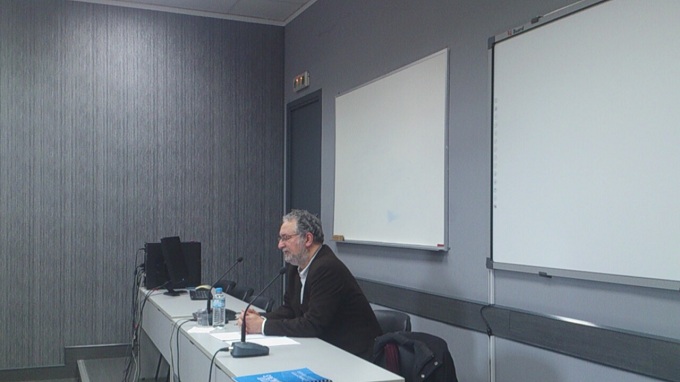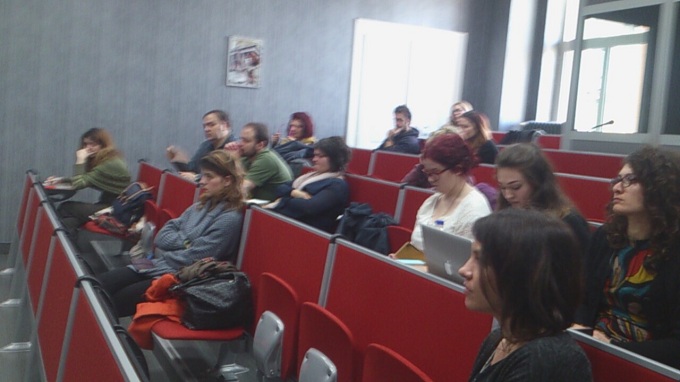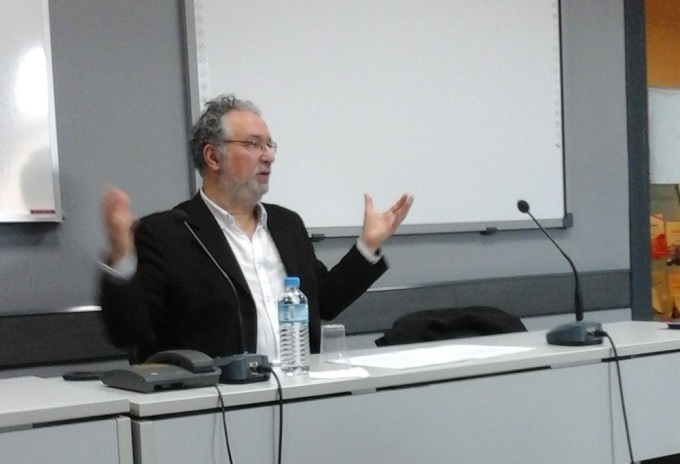In the frame of the 3-day event of the 4th altcineAction! Online Short Film Festival for Balkan Filmmakers, we had the pleasure to host the acclaimed French film critic (former Editor in Chief of Cahiers du Cinema), Jean-Michel Frodon, who gave an open masterclass on film criticism on January 22th, at the Institut Francais d΄Athenes.
But what is film criticism and how can it be defined? Let΄s see how Jean-Michel Frodon unveiled different elements of it during this extremely interesting and aspiring masterclass!
“This is an attempt to define film criticism by elimination through powers that try to use it as a tool to their own advantage – and that very often succeed in it. This approach allows us to outline a contrario what film criticism is, under the circumstances that have been profoundly modified within the last 15 years, as there has been a change in the access to films and the circulation of discursive forms they inspire through Internet. This approach lies voluntarily between film criticism and criticism in general.
I am talking about this particular field, film criticism, because I think that everyone will be able to distinguish what΄s common between film criticism and criticism about other arts; what criticism is about in general, which are the similarities between them – but with significant transformations – and singularities of film criticism, because of the characteristics of cinema, or particularly important for it. Its main singularity is that cinema is an «impure» form; it΄s at the same time art and industry, trade, entertainment, a cultural industry and a field of aesthetics. This «impure» form affects the object of criticism, cinema, but also the space and conditions within which it is practised. We can find it in very popular media outlets, but also in specialized magazines. I believe that this «impurity» is a chance and a ressource.
For instance, I think that André Bazin was able to build such an eminent place in cinema theory for himself, because he wrote in the magazine he founded Cahiers du cinéma, in Esprit, in Radio-Cinéma (the ancestor of today΄s Télérama) and in Le Parisien libéré. And I think that it was a chance for me to have worked as a film critic in a weekly magazine (Le Point), a daily newspaper (Le Monde), a monthly specialized magazine (Les Cahiers) and today, in an online platform Slate.fr, but also in a comics magazine, A Suivre, and a magazine for teenagers, Jeune et jolie.
So, what΄s the use of film criticism? Film criticism is useful, and that΄s what I am going to talk about. However, it is considered that it has to be useful, in the sense that it must serve the masters that want it make things that are not its real vocation. These abusive masters are four: salesmen, entertainement organizers, journalists and professors. And they are abusive because they try to subject film criticism to an aim that is strange to it. This does not mean that their objectives are intrinsically bad, wicked or harmful. On the contrary.
The first and most massive demand that film criticism is subjected to, consists in wanting it to become an auxiliary of the market, a promotion for the poor, or something that would offer real promotion an extra force. For producers, distributors, cinema operators and publicists working for distributors, and actually working for all of the above, film criticism helps in making films known and in trying to convince audiences into buying tickets and go to cinema, buying the DVDs or paying and downloading films. Their goal is legitimate. They defend their interests that are also the interests of cinema. Cinema is an expensive activity that has to bring in money so that it can survive, regardless what we think about how money is distributed. If we love cinema – and this is an imperative for a film critic – we cannot but wish that cinema is also a thriving activity.
Besides, salesmen serve critics also. It΄s thanks to them that critics have access to films before their release in theaters, generally under very good conditions.
So, there is a convergence of interests between salesmen and critics, even if their motives are not the same. Rights owners who count on film criticism in order to increase audiences, may want to load it with a mission that is not theirs; but this does not exclude de facto that film criticism can play an important role in the financial life of films. But, in a different and much less mechanic way.
There are statistics about what motivates audiences to go to cinema, and the relative weight of different incentives. A very simple research would be enough. One only has to stand in front of the exit of a theater and ask: Why did you want to see this film? The score of film criticism is stable; it΄s very low, about 7%. But like most statistics, it means not much unless we interpret it.
First of all, it΄s obvious that the influence of film criticism is different from one film to another. We can΄t say that it΄s proportionate to the marketing budget a film disposes of. The commercial effect of film criticism is almost non-existent for a very big release. It can play a major role for a film that has no other means of promotion. But word of mouth is what motivates people to go to cinema. And contrary to what we usually say, the role of the Internet hasn΄t made a big change. It΄s just that a big part of this word of mouth is now done online. Conversations between friends, colleagues, at work, at high school, at university, or in social networks motivate others to go and see a film and therefore make it successful. But this word of mouth must reach other people. As for the «big films» (films with stars, with already known and popular characters, with a big promotion and a large release), there is of course an audience immediately. And the audiences΄ reactions will determine the fate of the film. But as for the more «discrete» or low-budget films, i.e. the first feature film of a director, or a film from a faraway country, the role of film criticism is very important in order to send to theaters not many people, but for the first «word of mouth» that will speak (or will not speak) to others – and then again it΄s the first audiences΄ reaction that will decide on the fate of the film.
But most of all, film criticism builds an environment around films. Today, films lead a long life; when they are no longer screened in theaters, they are broadcasted in TV, in cable TV, released in DVD, in VOD; they are sold to distributors abroad, they continue to circulate for many years, even if we don΄t necessarily pay attention to it. A film that received good reviews, benefits from a more favorable environment, when those who decide must choose their programme. And the filmmaker benefits from this advantage, when he meets the sponsors or other possible financial supporters for his next film. Film criticism can never trigger commercial success on its own. It can only help to it. However, it has the power to change the destiny of a film or of a filmmaker, even if he hasn΄t been successful yet. Along with other important factors, festivals in particular, it can build a symbolic environment, which is very important for films that haven΄t a great commercial potential. This environment is beneficial for both films and filmmakers. It΄s also beneficial for cinema itself: it΄s thanks to film criticism – that treats each film as a piece of work, or at least as a possibility of a piece of work – that cinema can enjoy a respect that would never cost it it΄s only nature of an entertainment trade. And it΄s this particular symbolic recognition that serves as a base for the implementation of many means of support, in the name of cultural stakes, that cinema is invested by – artistic, educational value, the value of collective representation and influence in the world. Therefore, there is a direct link between the important place that film criticism holds in France and the extent of regulatory and financial systems of supporting cinema in this country.
Secondly, film criticism serves, actually we make it serve, as a consumer΄s guide. Very often, reviews are accompanied by little stars, little hearts, little guys that smile or cry… a whole set of signs that aims to the evaluation of a product. This practice is of the same movement; to divert the reason of being of criticism and to depreciate its object, considering films consumption products, in order to evaluate them, he same way we would do with a car or a fridge. However, giving advice on whether one should go see a film or not is not something bad. But this is not the reason of being of criticism. It eliminates the singular dimension of cinema that – among other things (mainly an entertainment of consumption) – is the promise of a work of art where the real legitimacy of criticism lies.
Thirdly, film criticism serves in using films for talking about something else. Critics usually work for newspapers where journalists also work (and who are not critics). It΄s mainly the case of editors-in-chief, that hold a higher position than critics. These journalists consider that everything can be tackled under the journalistic prism. Whether a film is «good» or «bad», whether it has accomplished what we call «promise of art» or not, if it deals with a problem that society is interested in, or if its reception becomes a phenomenon – and appears as something meaningful for society΄s condition… film criticism is under a lot of pressure, so it can tackle a film according to these approaches; i.e. as a piece of a case file (pollution, teenagers΄ discomfort, an episode of a war…), or as a symptom of society΄s condition. Confusion is very often increased by the fact that, in general press and also in the majority of cinema magazines, critics are also journalists. They create texts in classical formats of journalism, portraits, researches, reports, interviews, analyses, editorials, etc – all these practices are again perfectly legitimate. Therefore, it΄s very difficult to make criticism exist in this context; it could only be done by the particular position that subjectivity of the one who writes holds.
Finally, criticism can also be used as an equipment for learning. According to the model of academic knowledge, criticism contributes in accumulating information and analyses, not in society but in film studies in particular. Film criticism is required for a history of cinema class or a cinema technique class, or a study about the filmmaker΄s style evolution, etc. All these things can be interesting and form a corpus of knowledge on «cinema» or on one of its components. But it΄s no longer criticism in the real sense of the word.
These four uses of criticism have their legitimacy – and the writer of these lines prides himself on being journalist and teacher. But they all tend to ignore one of the distinctive features of film. A film is what these different masters make out of it, it΄s a commercial product that wants to be sold, an entertainment service that is subjected to evaluation, a document that evokes aspects of reality, a possible object for an academic study. But it΄s also something else. And it΄s to this something else that criticism responds.
Criticism concerns a type of very particular objects, that belong to the category of works of art. More precisely, it΄s the application of an artistic practice, literature (not only of a tool, writing) in order to take charge of works that may belong to all arts. If this is true already in Diderot΄s and Baudelaire΄s Salons, that open – through writing – a new access to another art, painting, this is due to what characterizes art production and that is common in both criticized objects and criticism. Not all critics do they write like Diderot or Baudelaire, far from that, but the work of a critic is based on writing skills, an ambition that working a phrase will offer access – through a particular way – to these objects that are particular too – the works of art.
The key characteristic of a work of art, of every work of art, is that it΄s an «open object» according to Umberto Eco, an object that we can describe its components, but whose result exceeds and will always exceed what we can analyze and explain – it΄s what Roland Barthes called «obtuse». And the work of a critic is not to explain this mystery, to answer the question that every work of art makes, and to which every viewer is urged to deal with. On the contrary, the work of a critic is to deploy the mystery, to open the space for its readers, so they can enter it easily, wander in it, inhabit it in their own way, so they can build their own endless dialogue with the work of art. A critic has the skills to do it, because his writing originates from an art, the art of literature; in a minor form, perhaps, but this is of no importance. One of the beauties and difficulties of criticism is to have to train in a space (the media), where everyone wants it to become something else. Besides, on of the major characteristics of a good review is that it΄s interesting to read, whether we have already seen the film or not: in any case, it must be able to evoke images and ideas to the reader. The consequence of this demand for the critic, is to have to write for the readers that have already seen the film, or that may go see the film after reading the review, or perhaps never see the film.
Another difficulty, that is not specific to cinema, but it deploys in it in a particularly active way, is that not all films are or even pretend to be real works of art. On the contrary, most of them look for useful, mechanical objectives, where trade, entertainment and information have their share, but that subjugate the audiences to strategies that can be sophisticated, without aiming in controlling emotions, thoughts and behaviors. Therefore, the work of a critic is to point out these mechanisms and their effects. But – and this is one of the most passionate dimensions – it΄s also to detect how an artistic dimension appears in a film, although it was never its intention: one of the greatest beauties of cinema is that it΄s capable of producing art, even when this is not the intention of those who make it.
In any case, a critic does not express an absolute truth. He expresses his own truth. First of all, the truth of his feelings and that his writing skills allow him to build, in phrases and ideas, generated by his own feelings, that lead him to build his own opinion. A critic does not dictate his own opinion on films. He has no right to do so and besides, what would be the point? He works on building a space for a vaster and richer encounter between a film and people, who are readers and viewers at the same time. This is the real creative gesture of criticism.
Today, this gesture comes from the literary world in a very dominant way: a critic is a writer (and not only a writer): he has to be a writer in order to do his job. However I am not the one who decides here who is up to this injunction. According to a specific modality, a «second» one, that depends on the existence of a first work (but which can assure that literary creation is the «first» one, we should say third, as films are the «second» ones, like any other work), and under specific and variable conditions, a critic leads the production of an object that is « holed », even if it΄s about a particular « hole », in response to the « hole » of the piece of work that triggered the critic. It΄s not imperative that criticism is only expressed through writing, even if this is its main response. When it exists in radio (that΄s rare), or even in TV (that΄s exceptional), criticism is almost always the oralization of a written text.
However, it΄s not a fatality. There is always the hypothesis of producing criticism in the same medium as the one of the criticized piece of work, the same way literature criticism uses writing in order to comment on a text.
In cinema, Jean-Luc Godard is an exemplary case. He has very often said that he and his colleagues in Cahiers du cinéma made cinema in the 50s with a pen, as they couldn΄t make cinema with a camera, as they didn΄t have access to. But he is the only one we can say about that he continued in making film criticism with a camera. Godard΄s films are also productions of art criticism, through the means of image, sound and editing. We could find echos of it in Chris Marker, Agnès Varda, Luc Moullet, Harun Farocki, Chantal Akerman, Gus van Sant…
But of course, it΄s also possible and even recommended, to ask the question of mibilization of other tools apart from cinema, especially those that make medias online possible.
We say that with the development of the Internet, criticism lost its importance. We cannot be assured about that, at least if we talk about the work of criticism and not about the situation of professionals of criticism, paid as such. Thanks to chatrooms and blogs, can anyone make a comment on films? That΄s true, but it has always been true: films make people talk, and that΄s one of their main qualities. In the past, we used to discuss after seeing a film, with our girlfriend or friends, or the next day, at the office or in the school yard. Now, we do it online and thousands of people «hear» what was intended for a small group of people. But what we would say to our friends, and we were right to do so, was not a review. Millions of «it΄s awesome», «it sucks», «did you see the actress΄ tits?» and other comments of that kind, are not a review either, even if these words are totally legitimate.
On the other hand, there are people in the Internet who, voluntarily, without belonging to an established media, make a real work of criticism, a work that demands a writing and thinking effort. It΄s excellent that access to criticism has been popularized – provided it does not confuse everything. I am talking about criticism now, not about professional critics, whose situation becomes more and more difficult.
Additionally to that, new technologies open new possibilities to critics, resulting from the powers of the digital tool: we can show pictures, clips, we can zoom in, compare shots, develop a new critical vocabulary thanks to the hypertext tools. Writing does not disappear in this context, it just takes on a new form. This is excellent news, or I΄d say a promise, as these tools are hardly used. But we can be sure that they will be used – although this doesn΄t mean that more classical forms of writing will disappear. They can coexist and enrich themselves.
Finally, according to another approach, the proliferation of means of broadcasting, and mainly the Internet – that offers access to all films – makes even more necessary the construction of a speech that helps building or rebuilding its place as a viewer. Among thousands of films that are accessible online today, potentially all cinema, the marketing works tirelessly, and with great means, to make sure that all people choose the same films and agrees to the same idea about cinema. It΄s critics, festivals΄ and teachers΄ duty to pave the way to other films, other styles, other ideas about cinema. In this sense, the Internet makes an intensification and a diversification of criticism possible and necessary.
The more there are films online and people to watch them, the more we will need film criticism, the more the market will want to destroy it so it can decide on its own, the more we΄ll have to defend it.”



